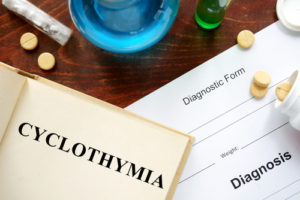
VA Compensation for Cyclothymic Disorder — Everything You Need To Know
Did you receive a denial of your cyclothymic disorder veterans’ benefits? A veterans’ disability advocate can help you appeal the denial.
Call today for a free consultation at (888) 373-4722.
Getting VA Disability Benefits for Cyclothymic Disorder
Cyclothymic disorder is a mood disorder characterized by swings between states of euphoria and depression. It is similar to bipolar disorder, but the highs and lows are not as extreme, and you may experience normal moods in between.
Because your mood and mental state can change rapidly from day to day, your cyclothymic disorder can make it difficult to hold a steady job, function in a social setting, and, in extreme cases, carry out daily living activities. For these reasons, the VA characterizes it as a disability. If your diagnosis is connected to your military service, you are eligible to collect benefits.
Causes of Cyclothymic Disorder
Cyclothymic disorder is rare, and researchers have not pinpointed a precise cause. According to MedlinePlus, many cyclothymic disorders begin early in life.
Like many mood disorders and psychological ailments, your cyclothymic disorder may be triggered or worsened by an external stressor, such as a traumatic or stressful event — something experienced by many military service members. An advocate can review your military records and help you establish that your current diagnosis is related to your service.
A Veterans’ Disability Advocate Can Help You Create a Compelling Appeal
An advocate will help you to establish three essential criteria:
- You have a diagnosis of cyclothymic disorder.
- You experienced a specific event in your military service that was traumatizing or troubling or that your condition started while you were serving.
- There is a nexus (or connection) between the event/onset and your diagnosis. This requirement is a medical nexus requirement, which an advocate cannot write for you. But sometimes your treating doctor is willing to be of assistance and other times the advocate can apply pressure to the VA to provide you with a compensation and pension examination.
Diagnosis of Cyclothymic Disorder
An advocate will use your medical records, doctors’ statements, and other evidence to show you have a diagnosis of cyclothymic disorder.
An Event in Your Military Service
By reviewing your service records, an advocate can identify an event in your military service which may be the cause of your current condition.
A Nexus Between the Two
The most crucial feature of your appeal is making the direct link between the event and your diagnosis clear. An advocate can do this a number of ways, which can sometimes involve expert opinions.
To start the appeal process today, call (888) 373-4722.
The VA Disability Compensation Scale for Cyclothymic Disorder
Your disability rating determines the monthly compensation you receive. Here is the schedule of ratings for cyclothymic disorder:
- 100% Impairment Rating: “Total occupational and social impairment, due to such symptoms as gross impairment in thought processes or communication; persistent delusions or hallucinations; grossly inappropriate behavior; persistent danger of hurting self or others; intermittent inability to perform activities of daily living (including maintenance of minimal personal hygiene); disorientation to time or place; memory loss for names of close relatives, own occupation, or own name.”
- 70% Impairment Rating: “Occupational and social impairment, with deficiencies in most areas, such as work, school, family relations, judgment, thinking, or mood, due to such symptoms as suicidal ideation; obsessional rituals which interfere with routine activities; speech intermittently illogical, obscure, or irrelevant; near-continuous panic or depression affecting the ability to function independently, appropriately and effectively; impaired impulse control (such as unprovoked irritability with periods of violence); spatial disorientation; neglect of personal appearance and hygiene; difficulty in adapting to stressful circumstances (including work or a work-like setting); inability to establish and maintain effective relationships.”
- 50% Impairment Rating: “Occupational and social impairment with reduced reliability and productivity due to such symptoms as flattened affect; circumstantial, circumlocutory, or stereotyped speech; panic attacks more than once a week; difficulty in understanding complex commands; impairment of short and long-term memory (e.g., retention of only highly learned material, forgetting to complete tasks); impaired judgment; impaired abstract thinking; disturbances of motivation and mood; difficulty in establishing and maintaining effective work and social relationships.”
- 30% Impairment Rating: “Occupational and social impairment with occasional decrease in work efficiency and intermittent periods of inability to perform occupational tasks (although generally functioning satisfactorily, with routine behavior, self-care, and conversation normal), due to such symptoms as depressed mood, anxiety, suspiciousness, panic attacks (weekly or less often), chronic sleep impairment, mild memory loss (such as forgetting names, directions, recent events).”
- 10% Impairment Rating: “Occupational and social impairment due to mild or transient symptoms which decrease work efficiency and ability to perform occupational tasks only during periods of significant stress, or; symptoms controlled by continuous medication.”
- 0% Impairment Rating: “A mental condition has been formally diagnosed, but symptoms are not severe enough either to interfere with occupational and social functioning or to require continuous medication.”
The monthly disability compensation for each rating as of December 2019 is:
- 0% rating: $0 per month
- 10% disability rating: $142.29 per month
- 30% disability rating: $435.69 per month
- 50% disability rating: $893.43 per month
- 70% disability rating: $1,426.17 per month
- 100% disability rating: $3,106.04 per month
If you are married and/or have dependents, the above rates can be higher once you have a 30% rating or more.
Get VA disability help today. Call (888) 373-4722 for a free VA disability case evaluation for cyclothymic disorder.



